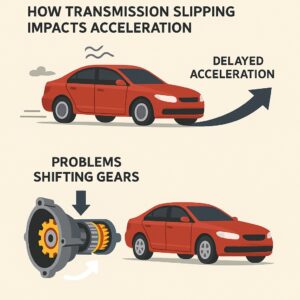As you navigate the intricate world of automotive mechanics, understanding how transmission slipping affects acceleration and gear engagement becomes crucial, especially if you are involved in a vehicular mishap. Transmission slipping can lead to a cascade of performance issues, compromising not only your vehicle’s efficiency but also its safety on the road. This technical glitch can severely impact your driving experience, making it essential to address it promptly. A Boise car accident lawyer might emphasize the significance of maintaining a well-functioning transmission to prevent accidents.
How Transmission Slipping Impacts Acceleration
Transmission slipping is a phenomenon where the power from the engine doesn’t transmit effectively to the wheels. When a transmission slips, it essentially loses its grip on the engine’s energy, resulting in an interruption in power delivery. This lack of synchronization can lead to a host of performance issues, most notably affecting acceleration and gear engagement.
Effects on Acceleration
When your transmission slips, the immediate result is a noticeable reduction in acceleration efficiency. Instead of a smooth and prompt increase in speed, a slipping transmission can cause hesitation or lag when you press the accelerator. This delay can be particularly hazardous in situations that require quick acceleration, such as merging onto highways or overtaking other vehicles. In the event of an emergency stop or sudden need to accelerate, this hesitation could increase the risk of accidents.
Consequences for Vehicle Performance
Slipping also impacts the overall performance of your vehicle. As your transmission struggles to engage properly, the engine may rev higher without a corresponding increase in speed. This not only leads to inefficient fuel consumption but can also elevate the engine’s workload, causing excessive wear over time. Moreover, frequent slipping can lead to further internal damage to the transmission, potentially resulting in costly repairs or replacements.
Prevention and Maintenance Tips for Transmission Health
Regular Fluid Checks and Changes
The lifeblood of your vehicle’s transmission system is its fluid, which plays a crucial role in both lubrication and cooling. To maintain optimal performance, it’s imperative to check the transmission fluid regularly and adhere to the manufacturer’s recommended change intervals. Over time, fluid can become contaminated with debris and lose its effectiveness. By ensuring your transmission fluid is clean and at the correct level, you can help prevent slipping and maintain smooth gear engagement.
Avoid Aggressive Driving
Driving habits significantly impact the longevity of your transmission. Aggressive acceleration, abrupt braking, and excessive towing can put undue stress on the transmission, increasing the likelihood of slipping. Adopt a more gradual approach to accelerating and decelerating, and adhere to your vehicle’s towing capacity limits. These practices will not only enhance your transmission’s lifespan but also contribute to safer driving overall.
Routine Inspections
Integrating regular transmission inspections into your vehicle maintenance schedule can help identify potential issues before they become severe. A qualified technician can assess the condition of transmission components, such as gears and clutches, and detect early signs of wear or damage. This proactive approach is crucial for avoiding costly repairs and ensuring your vehicle runs efficiently.
Understanding Warning Signs
Being aware of the warning signs of transmission issues can save you from future headaches. Symptoms like unusual noises, delayed shifting, or a burning smell are indicators that immediate attention is required. Addressing these signs promptly can prevent minor issues from escalating into major problems, thereby preserving the integrity of your transmission.
Final Thoughts
Understanding the implications of transmission slipping is crucial for maintaining optimal vehicle performance and safety. As you navigate the roads, recognizing the early signs of slipping can prevent further damage and reduce the risk of accidents. Proper maintenance and timely consultation with automotive professionals are essential. For those in Boise, addressing transmission issues promptly can also minimize the likelihood of requiring the services of a Boise car accident lawyer. By staying informed and proactive, you can ensure that your vehicle remains reliable, efficient, and safe for all your future journeys.
